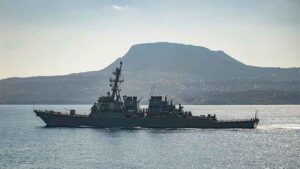
Citing U.S. and Saudi officials the New York Times reported:
Saudi Arabia has no interest in taking part in the new U.S.-led coalition to safeguard commercial traffic in the Red Sea from Houthi attacks, prioritizing domestic security and economic development instead,.
The kingdom views the prospect of peace on its southern border “a more appealing goal” compared to joining any naval action after eight years of war with the rebel movement that drained Saudi coffers and helped drive Yemen into one of the world’s most acute humanitarian crises, the newspaper reported on Monday.
Yemen has been engulfed in an armed conflict between the government forces and the Houthi rebels since 2014. The situation exacerbated in March 2015, when the Saudi-led coalition, working in cooperation with the internationally-recognized Yemeni government, began conducting air, land and sea operations against the Houthis. The latter have retaliated by attacking Saudi forces and firing missiles into Saudi Arabia.
After the armed conflict between Israel and Palestinian movement Hamas escalated in October, the Houthis have intensified their attacks on cargo ships linked to Israel in the Red Sea and the Arabian Sea, vowing to continue them until Israel ends its military actions in the Gaza Strip.
Last week, U.S. Secretary of Defense Lloyd Austin announced the establishment of a multinational operation to secure the Red Sea amid the surge in Houthis’ attacks on cargo ships, saying that the UK, Bahrain, Canada, France, Italy, the Netherlands, Norway, the Seychelles, and Spain would take part in the mission. The Houthis, for their part, vowed to attack any ships that join the US-led maritime coalition.
U.S.-led Red Sea Coalition
The U.S. has initiated Operation Prosperity Guardian, a multinational naval coalition to protect Red Sea commercial traffic from Houthi attacks. As of now, over 20 countries are on board.
The nascent U.S.-led coalition has already run into difficulties, with some allies committing just handfuls of ship-less seamen, and others deciding to sit out the U.S. military adventure altogether, preferring any naval assets they have in the region to go it alone.
The U.S.-led coalition comprises 20+ countries, including the UK, Bahrain, Canada, France, Italy, the Netherlands, Norway, Seychelles, Spain, Greece, and Australia.
Britain’s HMS Diamond is on board, operating as part of the U.S.-led Combined Maritime Forces.
Some participating countries, including at least eight, prefer not to be publicly named.
France supports navigation security, but will keep its ships under French command.
Italy is sending the frigate Virginio Fasan, but insists it is part of existing operations, not Prosperity Guardian.
Spain is opting for NATO-led or EU-coordinated missions, declining unilateral participation in Red Sea operations.
In the wake of the Israel-Hamas conflict that erupted on October 7, the Houthis, an armed group representing Yemen’s Shia Muslim minority, the Zaidis, have initiated a series of attacks in the Red Sea targeting ships heading towards Israel. Controlling a significant portion of Yemen, the Houthis declared solidarity with Hamas and announced their intention to target any ship heading towards Israel.
U.S. ‘Trapped’ In Red Sea, Should Prepare For Gibraltar Strait’s ‘Closure’, Says IRGC
The U.S. and its allies are “trapped” in the Red Sea and should prepare for the closure of waterways stretching all the way to the western gates of the Mediterranean Sea, Islamic Revolutionary Guard Corps Chief of Staff Mohammad Reza Naqdi has warned.
“With the continuation of the crimes [in Gaza], the United States and its allies should await the birth of new powers of resistance and the closure of the rest of the waterways and roads to them,” Naqdi said at a ceremony commemorating Hasan Irlu, a late IRGC commander and former Iranian ambassador to Yemen.
“The Zionist regime and the United States have gone mad due to the severity of the crimes and brutality they have committed, and they cannot even recognize their own interests,” Naqdi suggested, saying the two powers seem incapable of “learning from past events.”
Naqdi did not elaborate on what kinds of operations specifically may be taken to close regional waterways to US forces and their allies. However, U.S. media and news agencies immediately interpreted the commander’s words as an explicitly Iranian “threat” to “close the Mediterranean.”
The Biden administration Friday accused Iran of being “deeply involved in planning the operations against commercial vessels in the Red Sea” as part of a “long-term material support and encouragement of the Houthis’ destabilizing actions in the region.”
Iran has been open about its political and moral sympathies for and support for the Houthis, but has consistently denied many years of claims by US officials of the provision of material or military support to the Yemeni militia since its rise to power over much of the country in late 2014.
The Houthis are often mentioned by Iranian leaders and commentators as members of the Axis of Resistance, a loose, informal and unofficial political and military coalition opposed to Israel and American imperialism in the Middle East. Syria, Hezbollah, and Palestinian militias in Gaza are also typically listed as members of the informal grouping.
Naqdi’s remarks come against the background of growing tensions in the Red Sea and the Gulf of Aden as the US works to assemble a multinational coalition consisting mostly of NATO nations to try to secure the waterways after a month of Houthi hijackings and missile attacks against Israeli-owned commercial ships, as well as vessels thought to be heading to or from the Jewish State. The attacks have had a severe impact on Israel’s southern ports, and have prompted a handful of powerful international shipping concerns to stop the transit of any commercial cargoes through the Red Sea.
